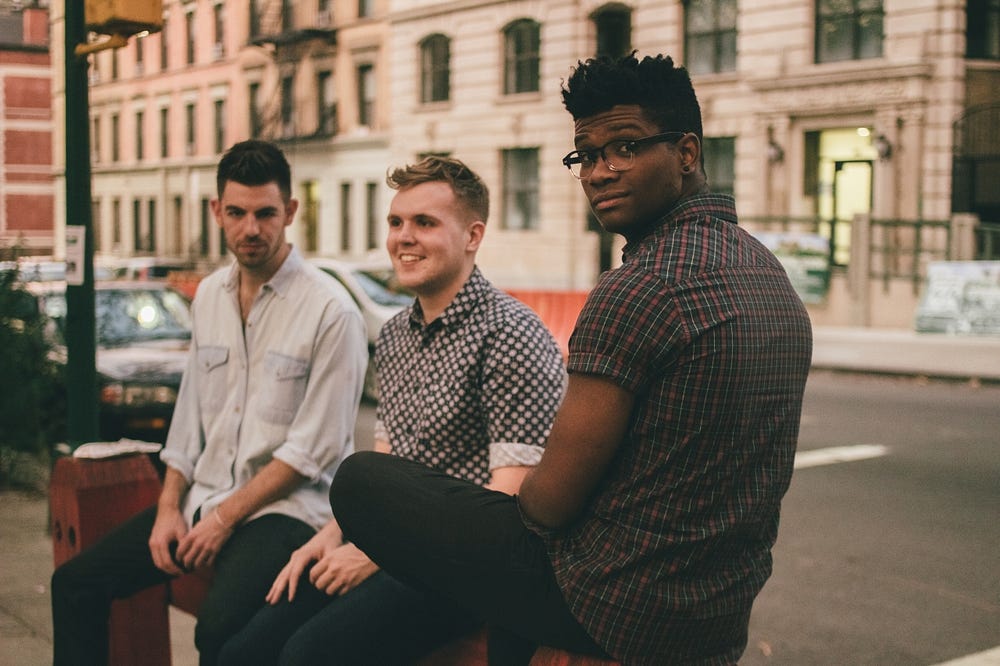THIRDSTORY
What do you call the band member who carries the others? The lead, right? Thirdstory markets themselves as three equals in one collaboration, but the footnotes to their story provide deeper context where identity and color matter. Not in the sense that music like theirs can’t be done by anyone with (incredible) talent and (harmonious) vocal ability.
However: one of these things is not like the other.
Can you tell which one?
Another reviewer has described the trio as comfortably looking the “New York City” chapter to their story, in that the all members fit some molds of Brooklynites. But it’s more than just a style conversation going on in their eponymously named debut, ThirdStory, that combines and and transcends genres. “G-Train” is an ode to here-one-moment, gone-the-next connections and romance, convincingly New York-ish where millions of people migrate in-and-out of the metropolis on a weekly and even daily occurrence. The actual “G”-train of the New York Subway winds through three of the four NYC boroughs giving riders a tour of diversely different neighborhoods and following a route that few people if any besides the designers would easily comprehend. It passes through historically Black neighborhoods like Clinton Hill and Bedford-Stuyvesant, now subject to gentrification and displacement of longtime residents. According to The New York Times, “Once mocked, loathed and avoided, the line now serves as a scrappy mascot for Brooklyn itself.” NYT should be reminded not to use the word “scrappy” when describing something that has a lot to do with Blackness so as not to perpetuate racism-as-animalism: dogs are scrappy, like Scrappy-Doo the son of racist trope, yet very beloved, Scooby-Doo.

—
Ben Lusher is a white-minority native of a Black-majority island where his singing career began before moving stateside. For those that wonder if the “diversity” industry garners people of color more (deserved) accolades or recognition (also deserved) in majority-white United States, the parallel is intriguing. That Lusher headlined a major music festival on his island begets questioning, surely not of his talent, but perhaps whether a similar bottlenecking of talent in a music industry exists there like here; are there fewer Black artists to headline the premier festival on the island? Lusher shared with a Bermudian publication:
“I’ve noticed that the Bermuda community really rallies behind Bermudians who are doing things on an international stage, whether it be football or music or whatever it is. They are incredibly supportive. I’ve been telling the other members of ThirdStory about my Island since I met them. Now they get to see it for themselves.”
I can only imagine (hope, really) that his Black bandmate had interesting questions to ask of his Bermudan-born friend, such as: how do you feel about getting that support from the island that your ancestors colonized? The reviewer I mentioned above that’s based in the same area as Skinner’s upbringing, in GuideLive, made the brilliant observation during a restaurant interview that Skinner (Black) borrowed money from Lusher (white) to “avoid a credit card surcharge,” demonstrating Skinner’s “frugal habits.” That one member moved from an island where he needed the support of fellow Bermudans who don’t look like him to get him stateside and the other is a Black-American who’s underrepresented in music acts like theirs and doesn’t have as fantastic a story would’ve been a more astute observation — and that Thirdstory would be duller without the color in the group.
Elliot Skinner is from Texas. He’s the Black guy in the group. And the guitar player. And the most gregarious. And controls the most vocally challenging bars, often of the highest register of the group to command. He’s the one playing the guitar in their live performances. Definitively, all three are fantastic vocalists, but the most exciting parts of the album are those showcasing Elliot’s raw, powerful pipes. He steals the show right from the start with the bridge of opening track “Searching for a Feeling,” — I’ve been searching for a feeling. Haven’t found it yet, hope I don’t regret it. I’ve been searching for a feeling. I’ve got every reason to feel — and as his voice raises and the final chorus rouses, it’s clearly found. In “Hit the Ceiling,” you’d think his voice is about to break from an emotionally and raspy plea to life itself, wailing: don’t leave me, don’t leave me dying alone! And he coos to a crisp on “Only Love” while channeling (all throughout the album) a powerful history of falsetto stars like Sam Cooke, Prince, Luther Vandross, Prince, Smokey Robinson, Michael Jackson, Rick James, Lionel Richie, and so on.
© 2018 Verve Label Group, a Division of UMG Recordings, Inc.
That history is part and parcel to ThirdStory’s appeal, that they can capture the devotion of fans and awe of crowds because their individual backgrounds don’t matter or blend together in their velvety-smooth trio of parts. Chance the Rapper chose ThirdStory to back-up a recent tour and also brought them to perform at NPRs “Tiny Desk” concert series. If ThirdStory seems post-racial (more astutely put: doesn’t talk about it), Chance is obviously not. Alas, they’re “Searching for a Feeling,” not a frontman; their third story is Blackness and that musically, the audience is reading between the lines noticing on which member they’re banking. It’s up to his conscious listeners to uplift Elliot in particular and not let him be whitewashed away.









